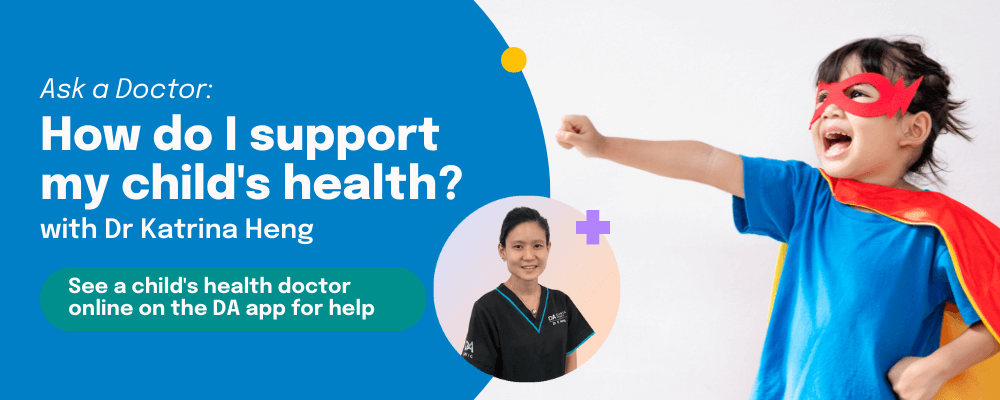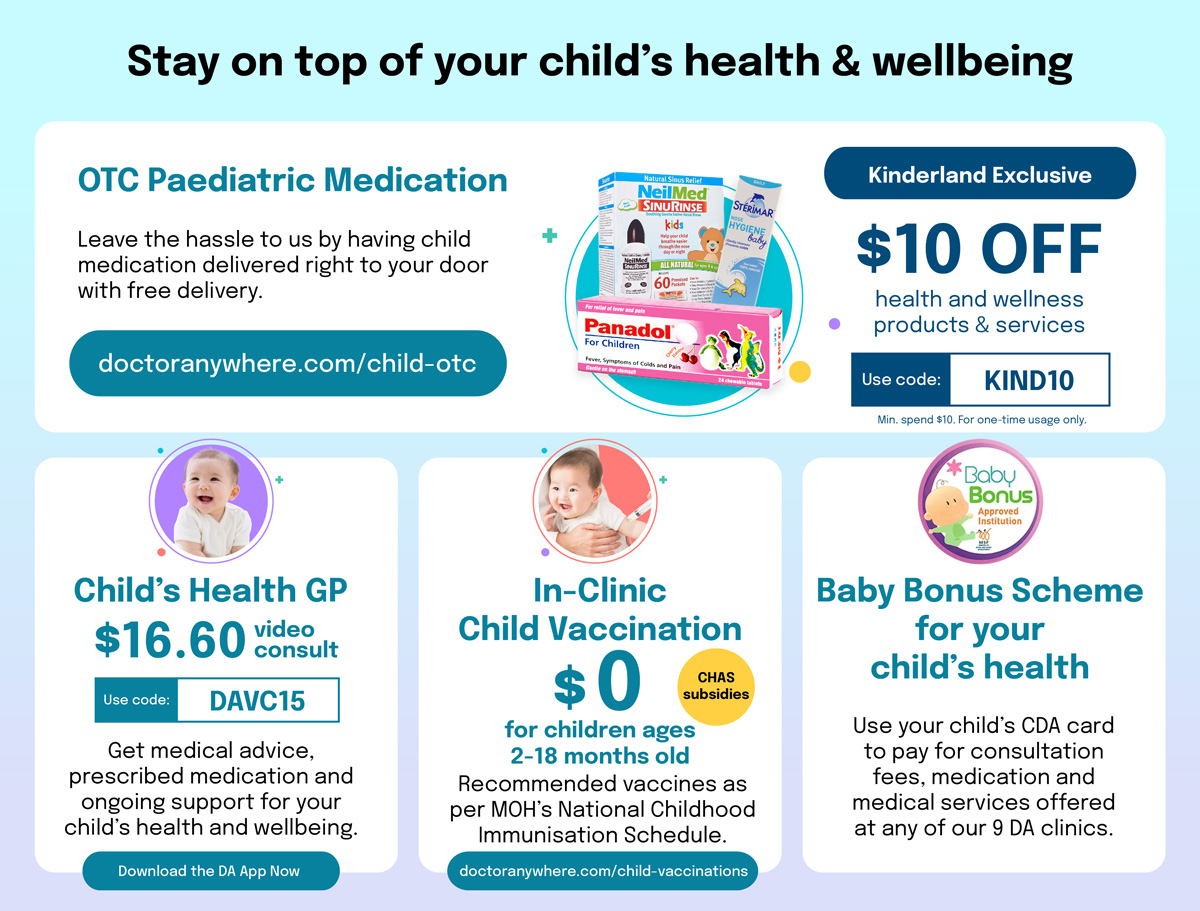
From playing in a new environment to having the opportunity to make friends, starting preschool is an exciting time for your child.
“Preschool is a time for growth for your little friend,” says Dr Katrina Heng, a medical doctor who sees paediatric patients with Doctor Anywhere. For example, they learn how to socialise and develop as an individual.
Along with the positive developmental growth, starting child care or preschool may also present its own problems: of top concern, your child may fall sick more often than usual. Dr Katrina shares more about what you can do to support your child’s health during this period so they can bounce back to their cheerful selves quickly.

FALLING ILL IS A NATURAL PART OF GROWING UP.
Preschool may be the first time your little one comes in contact with so many other children their age — which, in turn, also allows them to come in contact with their germs. “ also increases this physical contact,” says Dr Katrina, “Especially as children start to play together more.”
This can lead to your child falling ill more frequently when they first start school, as their immune system may not be strong enough to fight off the yet. “When your little friend reaches two years old, their immune system will be stronger to ward off germs.”
What you can do to minimise their risk is to teach your child good hand hygiene. “For example, washing hands before eating and after play.”
IF THEY ARE ILL, THERE ARE LITTLE WAYS YOU CAN HELP THEM TO MANAGE THEIR SYMPTOMS.
The two most common childhood illnesses are Hand, Foot and Mouth Disease (HFMD) and Herpangina. These are both contagious infections; as such, you may be asked to take your child home from childcare to prevent the infection from spreading to the other children or teachers.
When your child is ill, it’s likely that they will have a higher temperature. Fevers are a way that the body manages against infections. However, fevers may also lead to dehydration, especially in younger children.
“Prioritise hydration over meals,” says Dr Katrina. Children may struggle with eating when they are ill because of pain or discomfort. In the case of Herpangina, your child may have ulcers and injured surfaces in their mouth and tongue, which makes it challenging to eat.
“Focus on getting them to drink rather than eat. My go-to is room-temperature milk and honey water so that they get enough fluids to tide them through this viral infection.”
“Both Hand, Foot and Mouth disease and Herpangina are viral infections. As such, there is limited use for antibiotics,” adds Dr Katrina. “This is because antibiotics are usually used to treat bacterial infections.”
ALWAYS CHECK IN WITH YOUR DOCTOR IF YOU ARE UNSURE ABOUT YOUR CHILD’S SYMPTOMS.
When it comes to managing Hand, Foot and Mouth disease or Herpangina, your child’s symptoms should clear up in around seven days when the infection has run its course. “The rash and ulcers may be nasty to look at, but they are usually non-scarring and not permanent,” assures Dr Katrina if you are concerned about any possible scars.
“However, if your child is still unwell after seven days, it is good practice to check in with your family doctor to rule out any more serious medical conditions.”
BREAST MILK DOES HELP TO BOOST YOUR LITTLE ONE’S IMMUNITY — UP TO A CERTAIN EXTENT.
Breast milk is a great source of nutrition for your newborn baby. It generally contains all the nutrients your little one needs to grow up strong.
“Right after new mummies give birth, they produce a type of breast milk called colostrum,” says Dr Katrina. “Colostrum is really important to a newborn’s growth and contains everything that helps build your baby’s immune system.”
After a week or so, colostrum eventually transits to mature milk rich in protein, sugar, minerals and vitamins. The composition of your breast milk also changes over time. For example, breast milk may contain certain antibodies if the mother has fallen ill, which gets transferred via breast milk to your baby.
“WHO recommends breastfeeding until your child is six months old. This is because there is limited immunity passed onto your child after this period,” says Dr Katrina. “Following this, you can start complementary feeding and move your little friend to formula milk. This can also help mothers transition back to the workplace if they intend on doing so.”
WHAT IS MOST IMPORTANT FOR THEIR IMMUNITY IS A BALANCED DIET.
“The best way to boost your little friend’s immune system is having a well-balanced diet. This includes a good dose of Vitamin C and Vitamin D,” says Dr Katrina. This means making sure their plates are filled with a variety of fruits and vegetables and also making sure your little one gets outdoor time in the sunshine.
With good nutrition, there is generally no need to include additional supplements in your child’s diet.
Not to worry — we are here to help you support your little one’s health. We know it can be hard to get your child to the clinic. So Doctor Anywhere (DA) is here to make it easier to care for your child.
See a child-friendly doctor anytime you need on the DA app, for a variety of common childhood conditions. Alternatively, if you are sure of what you need, you can browse approved OTC medications for childhood illnesses on DA Marketplace.
Share:


